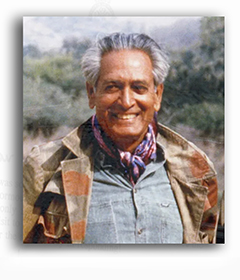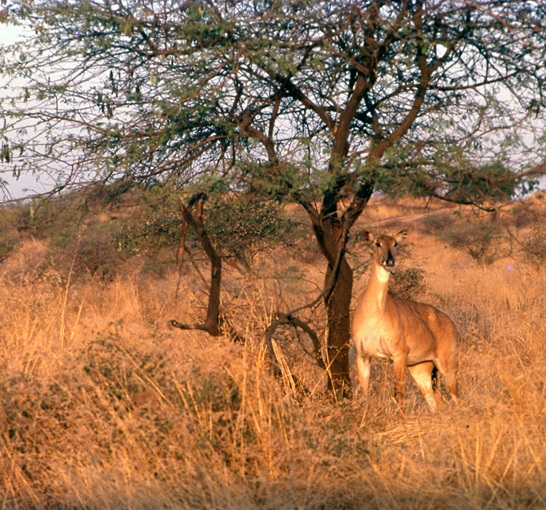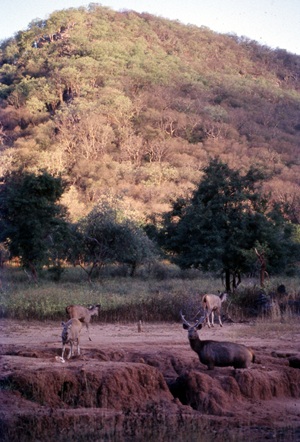Kailash Sankhala (b.1925-d.1994), famously known as the ‘Tiger-Man of India’, was a conservationist and the Founder-Director of Project Tiger. He played a key role in turning the tide for wildlife conservation in India, particularly of tigers. After obtaining a master’s degree in Botany from Jaswant College, Jodhpur, 1950, and postgraduate diploma in forestry, Indian Forest College, Dehra Dun, 1953, Kailash Sankhala, joined the Indian Forest Service in 1957. He began his distinguished career as Executive Conservator of Forests. He served as the Director of the Delhi Zoological Park from 1965 to 1970 and became known as the best ‘zoo-man’ in India.
Sankhala attended the 10th General Assembly of the International Union of Conservation of Nature and Natural Resources (IUCN) in New Delhi and presented a paper titled ‘The Vanishing Tiger’ sounding the alarm for a looming extinction of the big cat and requesting the inclusion of the species in the Red Data Book of the IUCN as a protected species. His proposal was accepted with overwhelming enthusiasm and support. Consequently, tiger hunting was banned by the Indian Board of Wildlife throughout India by July 1970. Project Tiger was launched in 1973 with nine tiger reserves under its purview and Kailash Sankhala was appointed its Director. He placed the project on a firm footing, making a success of the project and ensuring the survival of the Indian Tiger.
After completing his tenure as the Director of Project Tiger, Sankhala returned to Rajasthan in 1978 and served as the Chief Wildlife Warden of Rajasthan till his retirement in 1983. During this period, he established the famous Ranthambhore, Keoladeo Ghana (Bharatpur) and Desert National Parks, as well as many sanctuaries in the state.
He served as a Consultant for Protected Areas of India's North Western Region, for the Department of the Environment (1984-1985) and later was the lead author in preparing the Management Document Desert Biosphere Reserve, Jaisalmer (1985-1987). He was also the Founder Trustee and Chairman of Tiger Trust, served as a member of the senate of the University of Rajasthan, and as Pradesh President of the Vishnoi Jeev Raksha Committee of India.
Kailash Sankhala was lifelong researcher and feature writer on India's wildlife ecology and the environment. His book Tiger! The story of Indian Tiger (1978) is widely regarded as one of the most comprehensive book on India’s tigers and was translated into multiple languages. Some of his other noted publications are: Wild Beauty: A Study of Indian Wildlife (1973), Tigerland (1975), Gardens of God: The Waterbird Sanctuary at Bharatpur (1990), and Return of the Tiger (1993). He was an excellent wildlife photographer and took some of the most evocative wildlife images of his era.
Kailash Sankhala was also the naturalist-in-waiting to the King and Queen of Sweden during their royal visit to India's Kanha National Park in 1993 and to Prince Phillips, the Duke of Edinburgh, King of Bhutan, President of India, Prime Minister of India and many other national and international dignitaries.
Sankhala was the first civil servant to receive the Jawaharlal Nehru Fellowship in 1969 to study the tiger. He was bestowed with numerous awards for his contributions to wildlife conservation in India including Merit prize for Wildlife Preservation, Government of Rajasthan, 1965, Merit award for Outstanding and Original work, Government of Rajasthan, 1982, and Padma Shri, Government of India, 1992. The Government of Rajasthan posthumously conferred him with the Rajasthan Ratna award in 2013.
About the collection: A committed conservationist, forest officer, scholar and researcher, Kailash Sankhala’s rich collection of papers, especially his unpublished book manuscripts, draft manuscripts of published books, field notes, diaries, beautiful portraits of India’s wildlife along with thousands of photographic slides, and other relevant papers form an invaluable repository for all scholars and researchers interested in studying conservation policy and tiger conservation in post-independent India, tiger ecology, natural history of tigers, wildlife of Rajasthan, and other issues affecting nature and wildlife conservation in India. Catalogue available
Donor: Amit Sankhala
Acquisition: 2021






